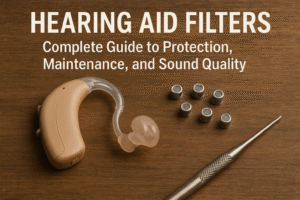
Table of Contents
Hearing loss is a common condition that affects millions of people worldwide, ranging from mild difficulty in understanding conversations to severe impairment that can disrupt daily life. The consequences extend beyond communication challenges, often impacting social interactions, professional performance, and overall mental well-being. For many, hearing aids offer a transformative solution, restoring clarity, enhancing speech understanding, and improving quality of life.
Despite their benefits, deciding where to buy hearing aids can be overwhelming due to the wide range of options available. Consumers may choose from specialized hearing aid clinics, audiologist shops, authorized brand dealers, or online platforms, each offering different levels of service, convenience, and pricing.
Understanding Hearing Loss
Before buying a hearing aid, it’s essential to understand your hearing loss. Hearing loss can be sensorineural, conductive, or mixed, and each type requires specific management. Consulting a professional at a hearing center ensures proper evaluation, diagnosis, and device recommendation. Services such as audiometry tests and tympanometry tests at Advance Hearing Center provide accurate assessments for children and adults alike.
Options for Buying Hearing Aids
When deciding where to buy hearing aids, you have several options:
Hearing Aid Clinics
Professional clinics specialize in hearing care, offering comprehensive assessments, device fitting, and aftercare. Clinics typically provide:
- Personalized consultation with audiologists
- Custom fittings and earmolds
- Access to advanced hearing aid model
Visiting a hearing aid clinic ensures professional guidance and accurate fitting, reducing the risk of device issues.
Audiologist Shops
These stores focus on professional-grade hearing aids and direct support from audiologists. Benefits include:
- On-site hearing tests such as ABR tests and high-frequency hearing tests
- Device programming and troubleshooting
- Expert advice on selecting models suitable for lifestyle and hearing loss
Authorized Dealers
Authorized dealers sell genuine hearing aid brands with warranty coverage. They may not offer full audiology services but provide:
- Brand-specific models and accessories
- Official warranty and repair support
- Recommendations for professional follow-up
Online vs. Offline
Buying hearing aids online has become popular, but comes with considerations:
Online:
- Convenience and home delivery
- Sometimes lower prices
- Limited professional fitting and troubleshooting
Offline (Clinics and Shops):
- In-person assessments and adjustments
- Immediate access to audiologist support
- Customized solutions, especially for children or special needs
For parents concerned about pediatric hearing issues, services like baby hearing tests and baby hearing screening tests at Advance Hearing Center ensure children receive proper device recommendations.
Emerging Technologies in Hearing Aids
Modern hearing aids have advanced beyond simple amplification, offering features that improve usability and quality of life:
- Rechargeable Batteries – Eliminates the need for frequent replacements and ensures consistent use
- Bluetooth Connectivity – Stream audio directly from phones, TVs, and other devices
- Noise Reduction and Directional Microphones – Improves understanding in crowded or noisy environments
- Smartphone Apps – Allow remote adjustments and personalization
- Integrated Sound Therapy – Useful for tinnitus management
Professional hearing centers like Advance Hearing Center guide on selecting the right technology and assist with proper setup, ensuring you maximize device benefits.
Factors to Consider Before Purchasing
When choosing a hearing aid, several important factors should guide your decision:
- Type and Severity of Hearing Loss – Understanding whether your hearing loss is mild, moderate, or severe helps determine the suitable device. Certain types, like sensorineural, conductive, or mixed loss, may require specialized solutions.
- Lifestyle Needs – Consider your daily environment, such as workplaces, social gatherings, or exposure to noisy settings. Active lifestyles may benefit from more durable, water-resistant devices with advanced noise reduction.
- Device Type – Options include Behind-the-Ear (BTE), Receiver-in-Canal (RIC), In-the-Ear (ITE), or Bone-Anchored Hearing Aids (BAHA). Each has unique features, comfort levels, and suitability depending on your hearing profile.
- Budget – Hearing aids vary widely in price based on technology, brand, and features like rechargeable batteries or integrated sound therapy.
- Support and Warranty – Ensure the dealer or clinic provides warranty coverage, professional adjustments, and reliable aftercare.
Why Professional Support Matters
Purchasing from a professional hearing center such as Advance Hearing Center offers several advantages:
- Accurate Evaluation – Comprehensive audiometry tests, including tympanometry tests and audiometry tests, ensure precise assessment of your hearing needs.
- Custom Earmolds and Fittings – Tailored fittings improve comfort, sound quality, and device effectiveness.
- Access to Advanced Solutions – For severe hearing loss, options such as cochlear implants in Cambodia may be available.
- Ongoing Maintenance – Professional hearing aid servicing ensures longevity, proper function, and timely troubleshooting.
Professional guidance helps avoid common pitfalls, ensures optimal device performance, and maximizes the long-term benefits of your hearing aids.
Maintenance and Servicing
Regardless of where you purchase your hearing aids, proper maintenance is essential to ensure optimal performance, longevity, and hearing quality:
- Daily Cleaning – Use a soft, dry cloth or specialized cleaning tools to remove earwax, dust, or debris from the device. This prevents clogging and ensures clear sound.
- Battery Care – Replace disposable batteries regularly or ensure rechargeable devices are fully charged to avoid interruptions. Proper battery management enhances device reliability and prevents damage.
- Periodic Professional Checkups – Schedule routine visits to your hearing center or audiologist shop. Services may include checking device calibration, repairing minor damages, and verifying that sound output remains optimal.
- Advanced Device Support – For specialized solutions such as BAHA devices, professional servicing ensures the implants function correctly and provide maximum benefit.
- Moisture and Storage Management – Keep hearing aids in a dry, temperature-controlled environment when not in use. Using dehumidifiers or drying cases can prevent moisture-related damage.
- Software Updates – Many modern hearing aids include programmable software. Regular updates by your audiologist or authorized dealer improve sound processing, noise reduction, and compatibility with new accessories.
- Early Issue Detection – Professional maintenance allows early detection of minor problems, preventing costly repairs or replacements in the future.
Regular maintenance, combined with professional servicing, ensures your hearing aids continue to deliver excellent sound quality, comfort, and reliability over time.
Conclusion
Choosing where to buy hearing aids involves balancing convenience, professional support, and device quality. While online options are available, clinics, audiologist shops, and authorized dealers offer comprehensive services for accurate fitting, maintenance, and long-term support.







